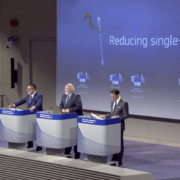What’s the deal with the Plastic Soup again?
March 15 2024 That’s what readers of news site nu.nl on their comment platform Nujij were wondering. In a recent […]
Amsterdam, 30 May 2018 – For thirty years, plastic pollution has been monitored in the deep sea. The outcomes of this study were recently published in the journal Marine Policy. They show for the first time that plastic pollution occurs at depths of 6,000 metres and beyond. In the Mariana Trench, the deepest part of the world’s oceans, a plastic bag was found at 10,898 metres. Most of the research was carried out in the western Pacific Ocean where 1,109 larger pieces of plastic were found at great depth. Eighty-nine percent of them were single-use plastics. The highest concentration of plastic was found at around 6,000 metres depth, with 335 pieces of plastic per square kilometre.
As no light reaches these depths, there is little life here. However, these areas display a striking phenomenon. Fissures in the earth’s crust mean that minerals from the hot and cold layers enter the water. These minerals are a source of food for so-called chemosynthetic bacteria. In turn, these bacteria are the base of the local ecosystems that include giant tube worms, different species of fish, corals and sea anemones. Photographs around the cold fissures show organisms entangled in plastic.
Up to now, little is known about the quantity of plastic in the deeper parts of the ocean. This is worrying because life at these great depths is highly vulnerable to disruptions in their very slow growth rates. It is therefore essential that more research is done into the quantity of plastic in deep sea ecosystems and any potential harmful effects.
March 15 2024 That’s what readers of news site nu.nl on their comment platform Nujij were wondering. In a recent […]
The first Impact Fair is Europe’s largest Impact Experience. An interactive ‘immersive’ experience of impactful examples.
The waste-export to countries outside of the EU has been restricted The Netherlands is against a carpet ban on shipping of plastic waste.
The waste-export to countries outside of the EU has been restricted The Netherlands is against a carpet ban on shipping of plastic waste.

 United Nations advises countries to take measures against plastic
United Nations advises countries to take measures against plastic